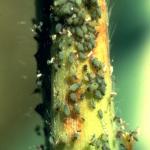Aphid, Corn Leaf
Rhopalosiphum maidis
Identification:
The corn leaf aphid (CLA) is blue-green or black, with black legs.
Life Cycle:
These aphids overwinter as females on grass weeds and cereals, particularly barley. Females produce live young which mature in as little as 6 days. There are up to 9 generations per year. CLAs first colonize whorl leaves and the immature tassel. Populations may become numerous enough to interfere with pollen shed and to stunt plants.
Monitoring & Thresholds:
Maize dwarf mosaic virus may be spread by the corn leaf aphid, though the most important vector for this disease is the green peach aphid. The presence of high aphid populations or honeydew on corn ears can render the ears unmarketable. Honeydew on ears may increase the number of CEW moths attracted to the plants. Monitor for aphids while scouting pre-tassel stage corn for ECB or FAW in late July or August. Pre-tassel stage sprays may be needed in dry seasons when 50% of the plants are infested. Sweet corn plantings that are seeded before 10 June are not bothered by corn leaf aphids. Varieties with purple or green tassels seem to be less susceptible to aphid build-up than those with yellow tassels. Ample rainfall or irrigation during the silk stage can reduce or eliminate aphid damage.
Cultural Controls & Prevention:
For Current information on production methods (including varieties, spacing, seeding, and fertility), weed, disease, and insect management, please visit the New England Vegetable Management Guide website.
Biological Controls
Natural enemies reduce aphid numbers but may not provide adequate control, especially in dry seasons. Whenever possible, conserve predators and parasites by using selective insecticides to control caterpillars before silking.
Crops that are affected by this insect:
The Center for Agriculture, Food and the Environment and UMass Extension are equal opportunity providers and employers, United States Department of Agriculture cooperating. Contact your local Extension office for information on disability accommodations. Contact the State Center Director’s Office if you have concerns related to discrimination, 413-545-4800 or see ag.umass.edu/civil-rights-information.
